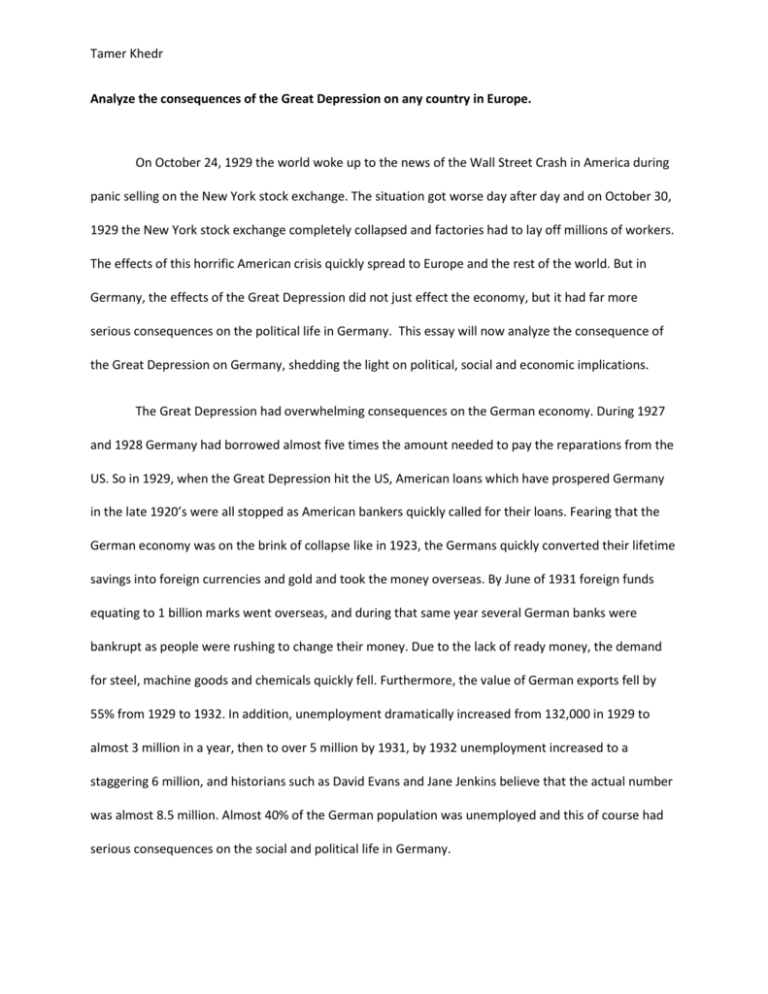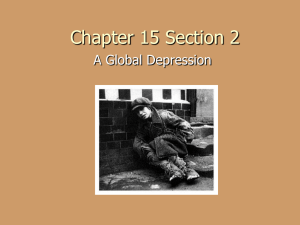Great Depression - Tamer - aise
advertisement

Tamer Khedr Analyze the consequences of the Great Depression on any country in Europe. On October 24, 1929 the world woke up to the news of the Wall Street Crash in America during panic selling on the New York stock exchange. The situation got worse day after day and on October 30, 1929 the New York stock exchange completely collapsed and factories had to lay off millions of workers. The effects of this horrific American crisis quickly spread to Europe and the rest of the world. But in Germany, the effects of the Great Depression did not just effect the economy, but it had far more serious consequences on the political life in Germany. This essay will now analyze the consequence of the Great Depression on Germany, shedding the light on political, social and economic implications. The Great Depression had overwhelming consequences on the German economy. During 1927 and 1928 Germany had borrowed almost five times the amount needed to pay the reparations from the US. So in 1929, when the Great Depression hit the US, American loans which have prospered Germany in the late 1920’s were all stopped as American bankers quickly called for their loans. Fearing that the German economy was on the brink of collapse like in 1923, the Germans quickly converted their lifetime savings into foreign currencies and gold and took the money overseas. By June of 1931 foreign funds equating to 1 billion marks went overseas, and during that same year several German banks were bankrupt as people were rushing to change their money. Due to the lack of ready money, the demand for steel, machine goods and chemicals quickly fell. Furthermore, the value of German exports fell by 55% from 1929 to 1932. In addition, unemployment dramatically increased from 132,000 in 1929 to almost 3 million in a year, then to over 5 million by 1931, by 1932 unemployment increased to a staggering 6 million, and historians such as David Evans and Jane Jenkins believe that the actual number was almost 8.5 million. Almost 40% of the German population was unemployed and this of course had serious consequences on the social and political life in Germany. Tamer Khedr The Great Depression sparked social and political unrest in Germany. The middle class Germans were mostly affected by the depression as their lifetime savings became worthless. The Germans blamed the incompetent democratic government for this depression. Moderate parties such as the SPD lost huge support from the Germans as the Germans looked elsewhere for an answer to their problems. The SPD had 153 seats in the Reichstag in 1928, but by 1932 their seats decreased to a record low 89. The German people were attracted to extremist political parties such as the KPD and the NSDAP that claimed that they could get Germany out of this depression. For example, in 1928 the NSDAP won only 12 seats in the Reichstag, but in 1930 it won 107 seats and by 1932 they had 230 seats in the Reichstag. Similarly the Communist KPD had 54 seats in 1928 and it managed to win 77 seats in 1930 and 89 in 1932. In addition, 20 different government coalitions were formed in almost two years as one coalition after another failed to resolve the consequences of the Great Depression. The failure of government coalitions made people lose faith in democracy as many Germans especially the army, the civil service and the judiciary wished to see a more authoritarian form of leadership. The Great Depression brought back memories of the 1923 hyperinflation and the Treaty of Versailles as members of the current government were responsible for these issues. Even the industrialists and the elites lost faith in Bruning’s government as they objected his economic policies which included higher taxations. All these people, including the middle class members, were attracted to the extremist political parties. The Great depression caused great political disunity in Germany and increased the tension between the Chancellor and his President. The German Reichstag was divided between completely opposite extremist parties. The animosity between these two parties was not limited to the Reichstag as SA members often engaged in gang fights with the Communists. Fearing this wide political unrest in Germany, Chancellor Bruning asked President Hindenburg to appeal to Article 48 of the constitution which gave the President emergency powers. But this caused further unrest in the streets of Germany as political parties wholeheartedly objected this decision. The Chancellor and the President failed to Tamer Khedr control the violence of the NSDAP and the KPD so in 1930, Bruning asked Hindenburg to dissolve the Reichstag and call for new elections on September 14th, and thus it was Hitler and the NSDAP’s golden opportunity to control the German Reich. As mentioned above, the NSDAP kept winning more seats each Reichstag elections and this gave them ultimate power within Germany and this enabled the rise of Hitler to power as he was the leader of the majority party. Finally, in 1933 Hitler entered the presidential elections and was able to win 36.7% of the votes and he became a force to be reckoned with. In conclusion, the Great Depression had horrific consequences on Germany. The Great Depression shattered the German economy and it drove people towards extremist parties, and this eventually led to the rise of Hitler. Hitler was able to use the dreadful economic situation in Germany to his advantage and was able to convince millions of people that he had the solution to their problems. Consequently, millions of helpless Germans were attracted to Hitler’s new demands and ideologies.






